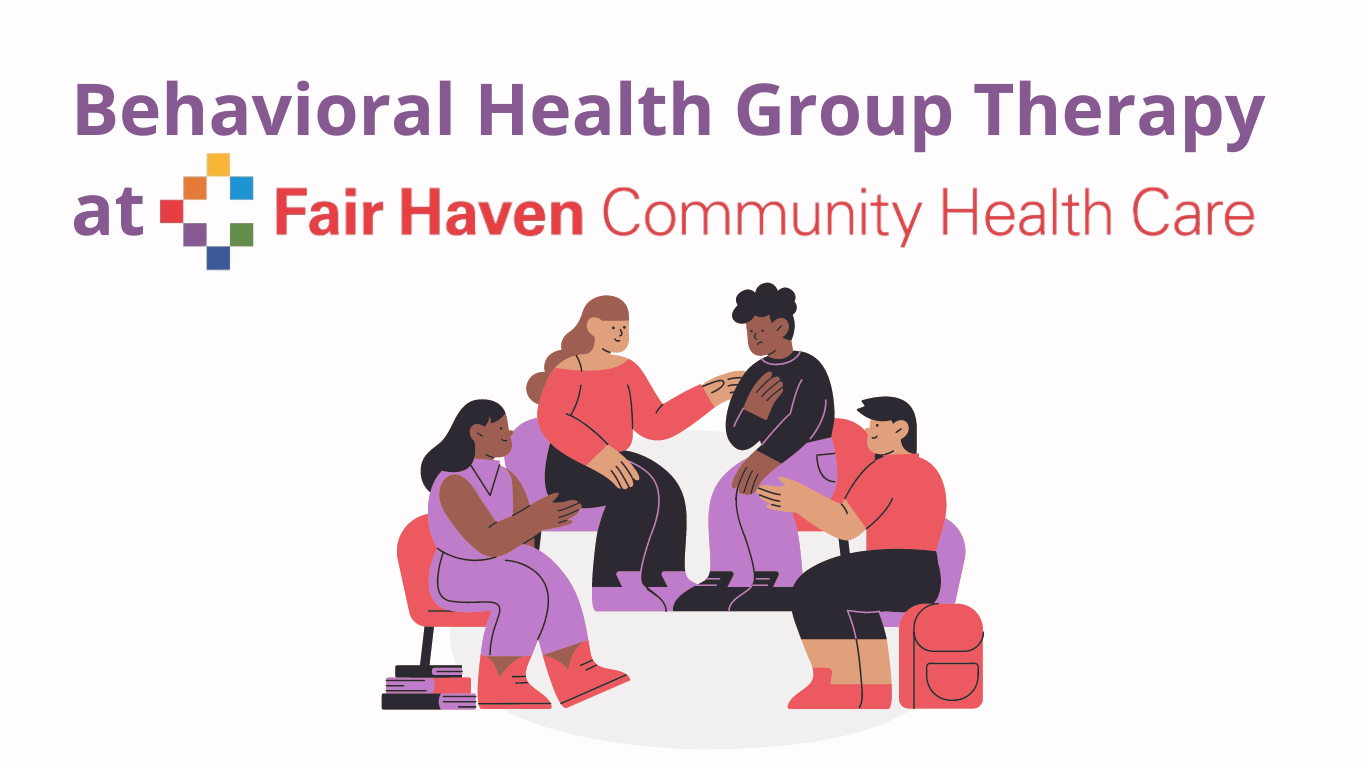Group Therapy at Fair Haven Community Health Care

Group Therapy
What is Group Therapy:
At FHCHC, our therapy groups can have up to 12 people in them at once, and usually last for about 10 to 12 weeks, depending on the topic. All of our groups are open, which means we will admit new members throughout the enrollment sessions.
Behavioral Health Adult Groups:
Postpartum Depression Group (Spanish)
Paola Perez, LCSW will be leading the following Group at 50 Grand Ave:
Postpartum depression is a common public health problem with serious and lasting consequences for mother and child, especially among low-income women. Maternal mental health is a critical component of perinatal care and maternal safety. Topics include psychoeducation on postpartum depression, managing the transition to motherhood, managing relationships, self-care, assertiveness and goal setting, and a review session. The intervention is highly structured and easy to learn.
Transgender and Gender Non-Conforming support group (English)
Luis Rios, LMFT is running the following Virtual Group:
Our Transgender and Gender non-conforming group is all about how the client can be resilient, grow, and thrive as a Trans or gender non-conforming person. Whether they are just getting to know who they are as a Trans or gender non-conforming person, or whether they have been out to themselves and others for long time—or somewhere in the middle—this group to help clients explore different aspects of who they are and what is important to them. Topics covered during this group, include discrimination, (transphobia), lack of access to healthcare, increased substance use. Mental health disparities compared to their cisgender counterparts, housing and homelessness, family support , financial barriers, discrimination in the workplace, (for those who can get a job), and poorer health outcomes like HIV compared to their cisgnder counterparts, and increased for homalicidality of black trans women.
Women Skills Group
Luis Rios, LMFT is running the following Virtual Group:
Our women’s support group is a safe place for women to explore their problems and issues. We promote healing through sharing, honesty and deep conversation. Our group members learn to better handle their everyday stresses, and manage depression, anxiety and anger. Topics that we will cover during this group include Relationships, Divorce, Parenting, Single life, Motherhood, Mid-life and aging, Body image, Depression and anxiety, loneliness.
Helping Men Recover
Dr. Mercado-Martinez will be running the following group at 374 Grand Ave:
Is an evidence-based program, gender-based, trauma-informed treatment program for substance use disorders. The group will present a clear understanding of the impact of male socialization on the recovery process, a consideration of the relational needs of men, and a focus on the issues of abuse and trauma. It emphasizes the core areas of men’s recovery: self, relationships, sexuality, and spirituality.
English and Spanish
Helping Women Recover
Dr. Mercado-Martinez will be running the following group at 374 Grand Ave:
Is an evidence-based program that integrates theories of women’s psychological development, trauma, and addiction, to meet the needs of women with addictive disorders. The groups addresses the areas that women in treatment identify as triggers for relapse: self, relationships, sexuality and spirituality. It includes the issues of self-esteem, sexism, family of origin, relationships, domestic violence, and trauma.
English and Spanish
CO-ED Skills Groups
Dr. Mercado-Martinez will be running the following group at 374 Grand Ave:
Its main goals are to teach people how to live in the moment, develop healthy ways to cope with stress, regulate their emotions, and improve their relationships with others. Topics include mindfulness, distress tolerance, interpersonal effectiveness, emotional regulation.
English and Spanish
Behavioral Health Children Groups:
Shoreline Family Health Center - Intensive Outpatient Program (IOP) Ages 11-18
Focuses on adolescents who are experiencing emotional and/or behavioral issues, family conflicts and difficulties meeting school and social expectations. We emphasize problem-solving and coping skills, emotional expression, learning how emotions and actions work together, and identifying behavioral and social disturbances. The adolescent IOP is a weekday, after-school program that provides comprehensive assessment, therapeutic structure and support within a group-therapy format. Clients typically participate in IOP four times per week for 8 to 12 weeks. IOP goals:
- Increase problem-solving and coping skills.
- Identify and change negative behavior patterns.
- Improve family and peer interactions.
- Improve emotional expression and school performance.
- Build an understanding of how emotions and actions work together by learning behavioral alternatives.
For more information visit: https://shorelinefamilyhealthcare.org/services/intensive-outpatient-program/
PST! We all feel... (English)
Ornella Merino, LMFTA and Ashley Garcia, LMSW will be running the following concurrent group:
This group aims to engage both parents and tweens/teens (ages 11-16) in two concurrent but individual groups (parents and children). It centers on helping the clients accept the reality of their lives and their behaviors, as well as helping them learn to change their unhelpful behaviors. We discuss the issues that result from unhealthy or problematic efforts to control intense, negative emotions that prevent healthy conversations and relationship between parent and teen.
Pressures and Bullying Ages 11-13 (English)
Caitlin Carey, LPC, ATR will be leading the following Group at 150 Sargent Drive:
Although bullying can start as early as preschool, by the time kids reach middle school, it has often become an accepted part of the school. In fact, bullying increases around fifth and sixth grade and continues to get worse until around ninth grade. Bullying occurs more often in the middle school and early teen years because kids are transitioning from being a child to an adolescent. They have a strong desire to be accepted, to make friends and to be part of a group. As a result, they experience peer pressure and want to look and act like their peers. In this group kids will learn: building relationships and communicating; fostering an understanding of and respect for diversity and difference; promoting and modeling the use of respectful language; Internet safety issues as they relate to cyber bullying.
